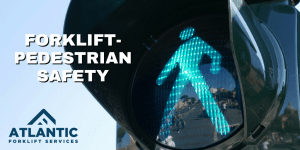 We discuss safety a lot here, because it’s important. Your forklift, like much of your machinery, is perfectly safe when operated within the guidelines but accidents do happen. People get hurt, even killed, in and around forklifts.
We discuss safety a lot here, because it’s important. Your forklift, like much of your machinery, is perfectly safe when operated within the guidelines but accidents do happen. People get hurt, even killed, in and around forklifts.
As we’ve established, the forklift operator has responsibilities to keep him/herself and co-workers safe; stay belted in to the cage, travel at safe speeds, use the safety accessories on the lift like lights, horns and reverse sirens, only haul loads on inclines in reverse.
However, the employees and staff working around the forklift bear some responsibility as well.
It starts with housekeeping. Keep the environment around the forklift and in the areas where the forklift is parked and where it does the bulk of its work clear from debris, trash, moisture and oil leaks. The forklift needs a clear, clean, wide space to function safely at its best.
Employees around a forklift should always wear a high visibility vest, and should be aware of the presence of the lift. That’s what the horn and reverse sirens are for. Electric forklifts run nearly silent, and a horn or siren may be the only method of alerting your staff to the unit’s proximity.
If you have the space, mark specific paths for pedestrians to walk around your facility- paths where forklifts won’t go. You could use signage or painted lines on the floor or even physical barriers to keep the trucks from invading the pedestrian’s space. Avoid forklift traffic in general around break rooms and restrooms- pedestrian high traffic areas.
You put your forklift operators through specialized training- what about your employees who may work around the truck? Training can cover the basic safety concerns like knowing forklifts can suddenly appear around blind corners, don’t ride on the forks (seems obvious but every year dozens of people get hurt riding on the forks), and how you should verbally alert the driver of the forklift if you are crossing the path behind the truck.
Safety in and around a forklift should never be taken for granted. There is no such thing as “business as usual” around a machine that heavy, on wheels, with a human operator, that can haul oddly-shaped loads.
Call us with any questions or concerns you may have. Our staff of experts can hook you up with training and advice to make your facility as safe as possible.
